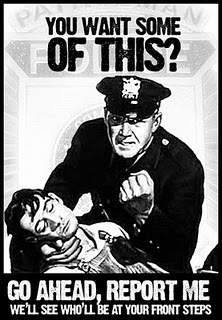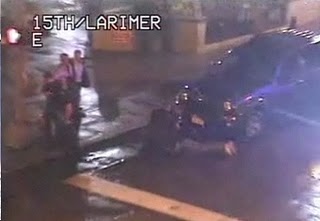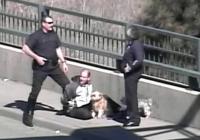
“I been forced to write my own laws, and you violated one in there. I just have to find you guilty of contempt of cop.”
— Bumper Morgan, Joseph Wambaugh’s eponymous Blue Knight, justifying his brutal assault on a young man who had casually insulted him.
Jared Lunn, a 21-year-old volunteer firefighter from Brighton, Colorado, visited Denver’s LoDo district to celebrate a friend’s birthday. The evening was quite pleasant until Jared, who was carrying a pizza and minding his own business, was suddenly punched in the face and knocked flat by someone he had never met.
Shortly after the assailant scurried away the police arrived, and Jared’s night took a pronounced turn for the worse.
Perhaps Jared was unaware of the axiom that it is never a good idea to ask the police for help. Perhaps the fact that he is involved in a “public safety” role led Jared to assume that the police would treat him with courtesy and professionalism. In any case, Jared told Officer Eric Sellers that he had just been assaulted and that he wanted to press charges. Sellers told the victim to go home, and he wasn’t impressed when Jared appealed to him as a fellow “public servant.”
“Way to ‘protect and serve,'” muttered Jared in disgust as he walked away.
A violent assault on a mere Mundane is a trivial matter — but this was a clear-cut case of “contempt of cop,” and it could not go unpunished.
Sellers seized Jared and threw him to the ground. While screaming a steady stream of profanities at the terrified young man, Sellers beat him and applied a vicious choke hold. After Jared’s body went limp, Sellers wrenched his hands behind his back and handcuffed him with such violence that the victim wouldn’t have full use of his hands for a week.
This felonious assault took place in the presence of two other police officers who, in keeping with the oath-bound discipline of their brotherhood, refused to intervene.
“This guy [Sellers] does this all the time,” one of the bully’s comrades told Chris Fuchs, an eyewitness to the November 23, 2008 assault, after Jared was released. “We don’t know how he gets away with it.” The obvious reply would be: “He gets away with it because of the guilty collaboration of ‘good cops’ like you.”

Two months later, Sellers became annoyed with a young man named John Crespin,whose behavior struck the officer as “nosy.” Sellers pulled up into the driveway of John’s home and ordered the young man out of the car.
As John complied, his shoulder brushed lightly against Sellers’s arm. Infuriated that a Mundane had defiled his sanctified personage through incidental contact, Sellers inflicted a dose of summary “street justice” as an act of ritual purification.
Just as he did to Jared Lunn, Sellers put John in a chokehold while spitting obscenities in his face. After handcuffing the victim, Sellers used his police baton to lift the young man a couple of feet from the ground, then dropped him face-first into the driveway. The representative of the Denver city government’s punitive priesthood dragged the bloodied man off the pavement, draped him over the hood of his police car, and administered the laying on of hands.
“He started punching me in the sides while I was already handcuffed,” Crespin later told the local NBC affiliate. “I told him to quit, quit, and he wouldn’t quit. He did it one more time and he grabbed my face and said, ‘Who the f*** do you think you are?'”
After being beaten into a lumpy mess, John Crespin — despite the absence of a criminal history — was charged with “felony menacing.” Terrified and worried about being separated from his newborn child, Crespin accepted a plea bargain agreement that resulted in probation.
Sellers was later found to have used “inappropriate force” against Jared Lunn. The same review found that the officer had compounded that offense through the “commission of a deceptive act” — that is, lying to internal affairs investigators. According to the Denver PD’s existing disciplinary guidelines, this is cause for “presumptive termination.” Yet Sellers continues to draw a paycheck as a member of the police force afflicting Denver.
In fact, Sellers — who, according to his colleagues, commits criminal assaults against innocent people “all the time” — complained in a court filing that the disciplinary action against him was “excessive,” because it specified that another episode of that kind would result in immediate termination.
 Denver’s Citizen Oversight Board insists, correctly, that Sellers should have been fired already (and prosecuted as well). The Denver Police Protective Association — that is, local armed tax-feeder union — has Sellers’s back, of course.
Denver’s Citizen Oversight Board insists, correctly, that Sellers should have been fired already (and prosecuted as well). The Denver Police Protective Association — that is, local armed tax-feeder union — has Sellers’s back, of course.
This isn’t surprising, given that in September 2008 — just weeks before Sellers assaulted Jared Lunn — the Denver police union distributed t-shirts to its members depicting a baton-wielding riot cop rising ominously about the city’s skyline.
“We get up early, to BEAT the crowds,” gloated the inscription. Each member of the Denver PD received one of the commemorative t-shirts, which were created in anticipation of the 2008 Democratic National Convention.
Sellers apparently perceived that ill-advised pun as a directive and took it to what passes for his heart. Interestingly, Sellers owes his continued employment to a figure who played a critical role in the militarized security preparations for the 2008 convention: Ron Perea, who until recently was Manager of Safety for the City of Denver.
Perea was the Secret Service Special Agent in Charge during the 2008 Democratic National Convention. His previous experience included a stint as head of the Denver Field Office for the Secret Service, a position on the executive board of the FBI’s Joint Terrorism Task Force in Los Angeles, and five years on the Albuquerque Police Department.
It’s difficult to imagine someone whose career offers a better core sample of contemporary law enforcement at all levels. So it’s quite significant that Perea, as Safety Manager, defined his job in terms of protecting the career prospects of abusive police, rather than protecting the public. As Safety Manager, Perea had the final say regarding complaints of excessive force. His decisions reflected an obvious desire to placate the demands of the police union, rather than holding abusive cops accountable for their offenses.
Perea resigned his post on August 31, barely three months into his $152,000-a-year job, because of rising public disgust over his handling of several recent episodes of criminal violence by the Denver PD. In addition to the leniency he had displayed toward Sellers, Perea refused to discipline Officer Devin Sparks, who severely beat Michael DeHerrera on a LoDo street corner in April 2009.
DeHerrera’s friend, Shawn Johnson, had been ejected from a local club after an altercation with a bouncer. When the police arrived, they “arrested” Johnson so violently that DeHerrera made a frantic phone call to his father, Pueblo County Sheriff’s Deputy Anthony DeHerrera.
“They’re beating up Shawn — what do I do?” a panicked Herrera asked his father. This apparently is what provoked Sparks to blind-side Herrera, slamming him to the sidewalk and repeatedly beating him with a leather-shrouded metal club called a “sap.”
This much is captured by one of the Panopticon-style High Activity Location Observation (HALO) cameras scattered throughout that section of Denver. However, just as Sparks lays into Hererra, the camera — which was operated by a Denver PD officer in real time — suddenly pans up and away from the scene.
Detective John White, a spokesman for the Denver PD, insists that this wasn’t an Orwellian “rectification” in real time, but rather a result of a camera following a pre-set program. Whether or not this is true, there is compelling evidence that Sparks and his partner, Corporal Randy Murr, took immediate action to cover up the crime. That evidence, interestingly, comes from an unimpeachable law enforcement source — Deputy Anthony DeHerrera, who overheard the officers via his son’s still-active cell phone.
“The last thing we [the elder DeHerrera and his wife] heard was, `We’ve got to get rid of the phone, they’re recording us.'” The phone went dead — leaving Michael’s parents to wonder if the same was true of their son.
After being beaten unconscious, DeHerrera was charged with “resisting” and “interfering” with the officers, but those charges were eventually dismissed.
The official report filed by Sparks claimed that as Corporal Murr was detaining Shawn Johnson, DeHerrera “was about 1 ft. away and began yelling and screaming at the officers. I advised him numerous times to get back and he refused. I then attempted to detain the defendant at which time he tensed up, made a fist and bladed his body. He then spun to his left attempting to strike me in the face with a closed right fist. I then took him to the ground where he attempted to strike me again….”
In his analysis of the video and other evidence, Richard Rosenthal, Denver’s Independent Police Monitor, concluded that the beating was an unwarranted act of violence and that the report filed by Sparks and Murr was “pure fiction.”
“In fact, the video shows that the complainant [DeHerrera] did not make any aggressive moves toward [Sparks],” wrote Rosenthal in his review of the case. “Although the complainant was not complying with [Sparks’s] orders to get on the ground, the complainant did not make any attempt to strike [Sparks], either before being taken to the ground or upon being taken to the ground.” In fact, as Rosenthal observes, the reports filed by Sparks and Murr were completely untainted by the truth.
Perea, claiming that unspecified “witness testimony” substantiated the claim that DeHerrera had threatened the officers, insisted that the “totality” of circumstances justified the beating. Despite finding Sparks and Murr guilty of falsifying official reports, Perea claimed that they were guilty of “inconsistencies” and “misperceptions,” rather than “`willful, intentional, or knowing deception,'” and thus weren’t subject to summary termination.
Rather than cashiering the perjurious police officers, Perea merely suspended them three days and “fined” one of them the equivalent of three days’ pay. In a footnote to his summary, Rosenthal notes that one of the officers (most likely Sparks) “received more serious discipline because that officer had a prior disciplinary history.”
In other words, he was a recidivist and proven perjurer. Nonetheless, Perea perversely insisted that he was still qualified to prowl the streets of Denver armed with various implements of violence and clothed in the supposed authority to inflict lethal violence on anyone who refused to comply with his whims.
Shortly before Perea’s resignation, video footage surfaced of another police beat-down as summary punishment for “interference and resistance,” this one involving a hapless pedestrian named Mark Ashford.

While walking his dogs in downtown Denver last March 16, Ashford saw an officer pull over a motorist for supposedly running a stop sign.
Acting out of a commendable civic concern, Ashford tapped on the windshield and told the driver he’d be willing to testify that the motorist had actually come to a full stop. This provoked the officer to demand that Ashford provide ID — a spurious, vindictive, and unwarranted order.
Ashford complied, and then quite sensibly began to record the incident with his cellphone camera. This prompted the heroic officer to call for backup. The two tax-fattened bullies — later identified as Officers John Diaz and Jeff Cook — then shoved the slightly built pedestrian up against a bridge railing, repeatedly punching him and trying to steal the camera.
After beating Ashford into submission, the officers left him handcuffed in a crumpled heap. After being booked on spurious charges — which were immediately dropped — Ashford was hospitalized with a concussion and a cut over his right eye.
Seeking to placate growing public concern regarding criminal assaults by Denver police, Chief Gerald Whitman told the local NBC affiliate that “the police department is under control” and that it actually receives fewer use-of-force complaints than departments in most other major cities.
Jared Lunn, who eventually settled his lawsuit against the department, offers a different view.
“Denver police, to me, are basically criminals with badges,” he told the Denver Post. “I have no respect for them [and] I somewhat fear them….”
Oddly enough, both Whitman and Lunn are correct: The militarized criminal syndicate called the Denver Police Department is not measurably worse than its counterparts in most major U.S. cities.
Video Extra: My New Anthem …
… courtesy of the incomparable goofball guitar virtuoso Paul Gilbert:
~*~
William Norman Grigg publishes the Pro Libertate blog and hosts the Pro Libertate radio program. He is a Christian Individualist, husband, father, and self-appointed pundit.
